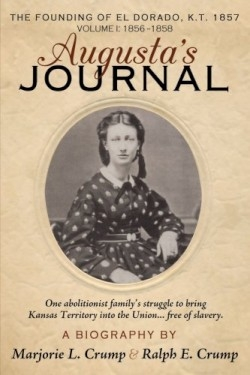Augusta's Journal
The siblings Crump began transcribing their great-grandmother’s journals some 150 years after Augusta Chase lived through the tumultuous settling of the Kansas Territory. In many ways that settling was a precursor to the Civil War. Congress declared that the state would vote for its own designation as slave or free state assuming that the predominantly pro-slavery population already settled would sway the balance in favor of slave-holding. The abolitionists decided to foil the plan gathering others sympathetic to their cause and creating wagon trains intent on settling in Kansas and swaying the vote. The ardor of both sides led to armed skirmishes all of which proved prescient as the Civil War began shortly thereafter.
Laura Augusta Stewart called Augusta by friends and family left Michigan with her father Sam and sister Adelaide. All three were compelled by the Abolitionist cause. They traveled overland by train then covered wagon. Augusta encouraged by compliments about her letter writing kept a journal in the hopes that it might one day be published. Her descendants the Crumps added transition to the journals excised some lengthy descriptions of the weather and provided historical context where appropriate. The end result is a fascinating report on the American pioneers and the ideological fervency that moved them.
Very well-educated for her time Augusta was a careful observer recounting conversations near verbatim and relaying news of all the political goings-on offering insight into the strategies of famous abolitionist fighters John Brown and Jim Lane. While readers hear about the struggles of creating home and hearth amid threats from proslavery guerilla groups and an antagonistic military Augusta also relates little observations about the overly friendly ministrations of a local boarding house operator her indignation at the familiarities taken by relative strangers like pressing her hand while dancing and the startling appearance of Native American boys peeping through the flaps of the family tent. The seventeen-year-old vies with the woman she is becoming in many of her entries as she moves between being a woman courted and a daughter concerned over her father’s incarceration as a prisoner of war.
For students of history particularly of the Abolitionist movement and the Westward expansion this book provides valuable insight into the lives of pioneers and the violent uproar of the times. While the volume ends rather abruptly the journey there is tumultuous and educational much like Augusta’s own ride.
Reviewed by
Camille-Yvette Welsch
Disclosure: This article is not an endorsement, but a review. The publisher of this book provided free copies of the book and paid a small fee to have their book reviewed by a professional reviewer. Foreword Reviews and Clarion Reviews make no guarantee that the publisher will receive a positive review. Foreword Magazine, Inc. is disclosing this in accordance with the Federal Trade Commission’s 16 CFR, Part 255.

